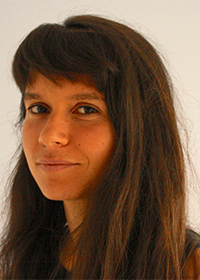Dr. Eftychia Stamkou

Dr. Eftychia Stamkou
Dr. Stamkou is currently a tenured assistant professor of Social Psychology at the University of Amsterdam, has been a visiting scholar at Columbia University of New York, and has worked as research consultant to Adidas. She completed her graduate and postgraduate studies with distinction in 2018 (cum laude) and has also obtained a degree in music composition in 2009 (cum laude). Her dissertation was a finalist for two prestigious Best Dissertation Awards in the fields of social and cross-cultural psychology. Her research has been published at the flagship journal of social psychology (i.e., JPSP) and other acknowledged journals (e.g., PSPB, GPIR, JESP).
She has been awarded a competitive doctoral grant (Research Talent Grant, NWO), a Fulbright postdoctoral scholarship, and a total of €238,332 in grant money. She developed and is currently coordinating the Cultural Psychology Master’s at the UvA, where she has an active role in mentoring master’s students.
Her current collaborators include eminent scholars in the fields of social psychology (Prof. Galinsky, Columbia University), cultural psychology (Prof. Gelfand, University of Maryland), and empirical aesthetics (Prof. Leder and Dr. Pelowski, University of Vienna).
Relevant (selected) publications
1.) Stamkou, E., Van Kleef, G. A., et al (in press). Cultural collectivism and tightness moderate responses to norm violators: Effects on power perception, moral emotions, and leader support. Personality and Social Psychology Bulletin.
2.) Stamkou, E., Van Kleef, G. A., et al (in press). Feeling entitled to rules: Entitled individuals prevent norm violators from rising up the ranks. Journal of Experimental Social Psychology.
3.) Stamkou, E., Van Kleef, G. A., et al (2018). The art of influence: When and why deviant artists gain impact. Journal of Personality and Social Psychology, 115, 276-303.
4.) Stamkou, E., Van Kleef, G. A., et al (2016). How norm violations shape social hierarchies: Those who stand on top block norm violators from rising up. Group Processes and Intergroup Relations, 19, 608– 629.
5.) Stamkou, E., Van Kleef, G. A., et al (2016). Are the powerful really blind to the feelings of others? How hierarchical concerns shape attention to emotions. Personality and Social Psychology Bulletin, 42, 755–768.
Relevant (selected) projects and activities
1.) “Climbing the ladder or falling from grace: How norm violations shape social hierarchies” (2012-2015). This project, funded by the Netherlands Organisation for Scientific Research (NWO), is about the potential of deviant targets to gain impact in their social milieu. This project included a large-scale comparative experiment that examined the impact of deviant targets across 19 diverse societies from Europe, the Americas, Africa, and Asia.
2.) “The art of influence” (2015-2017). This project, funded by the Propondis Institution (Greece), investigated the potential of deviant artists to gain impact. The project showcased how social influence mechanisms that have been widely investigated in social psychology and marketing, among other fields, generalize to the domain of empirical aesthetics. This project involved data collection in museums in the Netherlands, including the Museum Boijmans van Beuningen, Rotterdam, and the Cobra Museum, Amstelveen.
3.) “What drives you to make art? (2017-date)”. This project investigates the motives for making art in diverse societies. We have conducted semi-structured interviews with artists from the US and the Netherlands, and in the context of the current project, we will include artists with diverse cultures backgrounds across European countries.
4.) “Cultural perspectives on social norms: Insights from research and the field” (2018). This international conference was organized by Dr. Stamkou and Prof. Van Kleef and was funded by the Graduate School of Social Psychology in the Netherlands, the Kurt Lewin Institute. The goal of this interdisciplinary conference was to stimulate a dialogue between renowned scholars from diverse disciplines (behavioral economics, management, cultural-, social-, and developmental- psychology) and stakeholders (e.g., the Dutch Authority for Financial Markets, ABNAMRO bank) to discuss how psychological insights can help to address concrete societal and organizational challenges.
